
Card Quest Review
As a general rule, I have about as much interest in playing card games as I do in joining a knitting circle. As a child, I was terrible at them. Even 'Snap!'. (Possibly because I have the reflexes of an Amazonian tree sloth.) I tend to find them repetitive, boring and the rules are frequently so convoluted I feel like I've accidentally wandered into an advanced calculus lecture. But not Card Quest. Card Quest is an altogether different beast. Card Quest... is fun. (And admitting that makes me feel as though I've just crawled through a sewer.)
Graphically, the game looks a bit like something produced for the Commodore 64 circa 1987, but as someone who routinely spent hours playing The Last Ninja when he should have been doing his maths homework, I can appreciate the aesthetic. Others might be less forgiving. (And probably better at maths.) Sound is unexpectedly polished. The music on the title screen is all ominous and dungeon-y, which was a pleasant surprise. Given the look of the game I was expecting variations of 'doo-doo-diddly-dee' on a Casio keyboard, with a smattering of combat sound effects and location dependent ambient noise. Card Quest looks, quite unapologetically, as though it was cobbled together on the smell of an oily rag. But triple-A budgets do not necessarily a good game make... isn't that right, EA? It's all about the fun. Did I have fun? Oh, yes. I had more fun than Reeves and Mortimer down a storm drain.
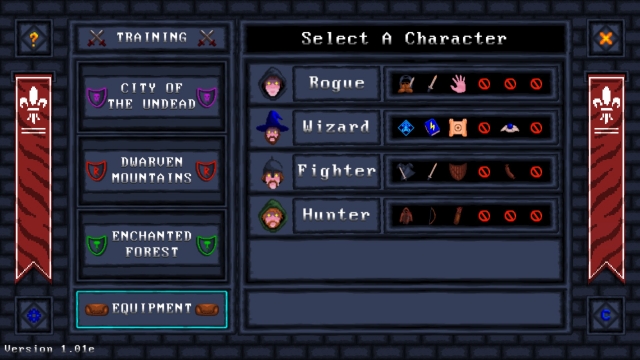
If you complete Fighter training, you'll receive... a sausage.
At its heart, Card Quest is a hybrid. WinterSpring Games has cleverly merged an RPG dungeon crawl with a single-player card game, and despite this potentially being a recipe for some sort of joyless abomination, they've somehow managed to pull it off. Not only does it work, it works really well.
There are four playable classes - wizard, fighter, rogue and hunter. They all play very differently, and like me, you'll quickly discover being pretty handy with the fighter doesn't necessarily mean you'll be any good with the hunter. Or vice versa. You're given a brief and very basic tutorial on how combat functions, and then you can opt for some character specific training. Do the training. Seriously. Not only will you get to grips with the various cards the different classes use, once you successfully complete your training you'll be awarded a unique character-specific item which makes the meat and potatoes of the game proper a little less punishing. Because you will be punished. Hard.
So, how does this card combat stuff work then? In your deck, generally speaking, there are three card types - attack, defence and utility. Attack cards, as you might have guessed if you're at all paying attention, govern the various attacks your character can make. Likewise, defence does exactly what it says on the tin. Utility cards have a variety of effects, most of which help keep you alive, boost your attacks or provide you with additional cards. Combat is turn-based. You have an attack phase, during which you attack (yeah, thanks for that, Captain Obvious), and a defence phase, during which... you see where I'm going with this, right? Okay, so you fling cards about with gay abandon until you win, or you're dead. Is that about the gist of it? No, actually. If only it were that simple.
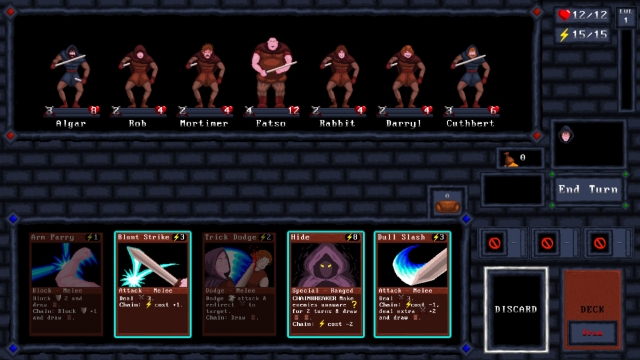
So... seven against one, then? Pffftt. Easy.
Complicating matters are your resource pools - health, stamina and a resource specific to each class. Health is fairly simple. If you get stabbed too many times, you die. Stamina is essentially the cost of each action. Certain cards cost a certain amount of stamina, and more powerful cards are more expensive. Utility cards can be used to replenish this resource, but managing it effectively is critical to success. If you go crazy-ape-bonkers during the attack phase and exhaust your stamina, you'll have no means of defending yourself during the defence phase. And then you'll die. Class-specific resources are accrued during combat and used for special attacks. The wizard acquires arcane charges, the hunter employs arrows and the fighter uses tactics. Some of the attacks that make use of these class-specific resources are devastating, and I frequently found myself surviving a particularly hairy encounter solely due to the timely deployment of a special attack. Hoarding these precious resources pays dividends.
What really impresses me about Card Quest is the sheer depth they've managed to cram into what, on the face of it, is a relatively simple mechanic. Playing as the wizard is nothing like playing as the rogue, and the effort put into making each character feels unique, and equipping them with decks that are so very different deserves recognition. By way of example, the rogue's abilities predominantly revolve around stealth and dirty fighting. He's able to hide, driving opponents back and rendering them unable to attack for a number of turns. And Trick Dodge, a card which allows the rogue to evade an attack, then redirect that attack at another enemy, saved my backside on several occasions. During my time playing, I didn't see one card that had me thinking, "Well, this one's a bit crap. I'll bin it." Every weapon in your arsenal has a purpose, and only by using those weapons in the most effective manner will you emerge triumphant.
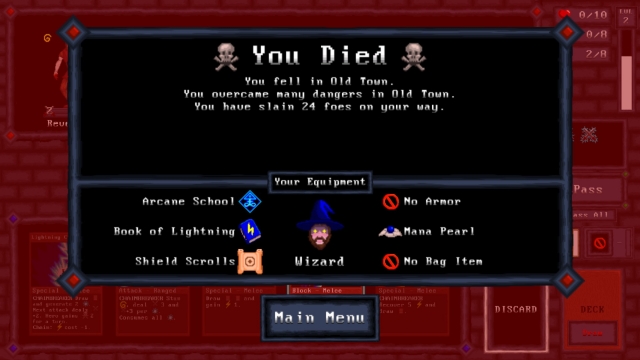
Get used to this screen. You're going to be seeing it a lot.
Enemies are varied and never fail to present a challenge. You have hulking behemoths whose own strength is best leveraged against them, hordes of goblins or revenants who swarm you and wear you down in what swiftly becomes a war of attrition, archers, spell-casters and the mandatory boss monsters. Upon defeating a boss (and good luck with that - it isn't easy), you'll be awarded a unique item you can equip in your character's inventory. These items, along with the perks you select as you level up, make the difference between a gruelling slog and steady, yet challenging, progression.
One of the best things about the game is its flexibility. As each class gains levels they unlock alternative decks. The wizard begins with the deck of lightning, but gain sufficient experience and you'll unlock the deck of scorching, which allows him to become a pyromancer. The rogue can become a swashbuckler, or assassin; the fighter a berserker, or paladin. Each of these alternative decks necessitates a subtle change in how combat is handled, as anyone who's ever played Dungeons & Dragons can tell you, there's a chasm of difference between a paladin and a berserker. WinterSpring have put serious thought into giving players both the tools and the freedom to play Card Quest in a manner most suited to their preferences and play-style. What's more, the game comes with three reasonably sized dungeon crawls - City Of The Undead, Dwarven Mountains and Enchanted Forest, all replete with enough sprites, ghouls, ogres and liches to keep even the most introverted beardie-weirdie happy.
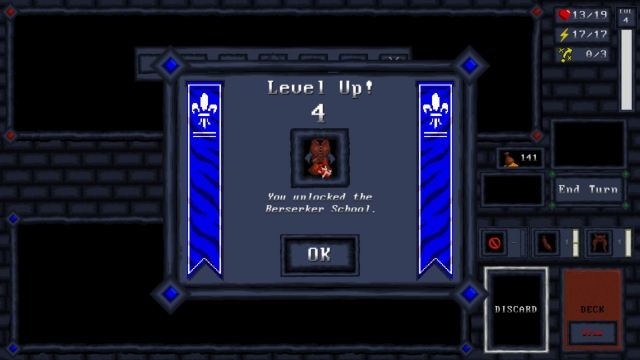
If you live long enough, you'll unlock additional decks.
Card Quest is not an easy game. Oh, sure, it lulls you into a false sense of security during the first few training levels, patting you on the head and cooing "there, there" at you... before caving in your skull with a spiked mace and smearing your innards all over the walls. It's a game that demands patience, observation, prioritisation and the ability to think strategically. Victory comes not just from playing the right cards, but from playing them in the right order. You will die a lot. You will shake your fist at the heavens and curse the misbegotten nerds at WinterSpring Games for their sadism. But you'll come back, again and again. Because Card Quest is one of those "just one more go before bedtime" games, and it's just that good.
Card Quest (Reviewed on Windows)
This game is great, with minimal or no negatives.
If you can get past the retro graphics, and you don't have a pathological hatred of card games, you'll find Card Quest fun, engaging and horrendously addictive.


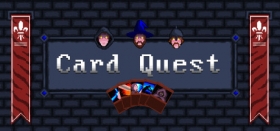







COMMENTS